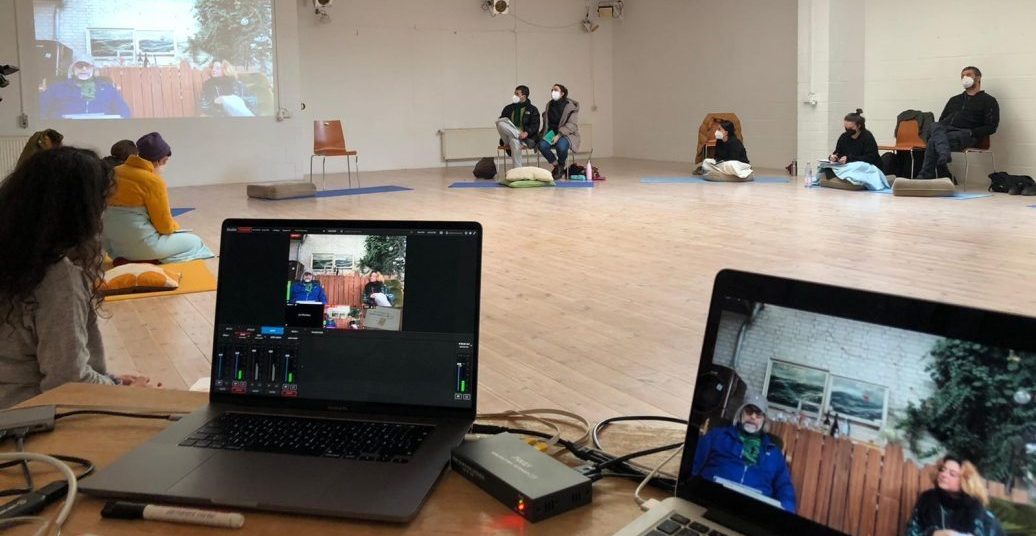During the first weekend of May, Lake Studios Berlin hosted the first volume of ABOUT DANCE. Entitled forming futures, this forum for dance professionals was proposed by Mårten Spångberg and Alex Viteri Arturo, with online contributions by André Lepecki, Jota Mombaça, Nina Power, Filipa Ramos, Julian Reid, Jana Unmüßig, and Miriam Jacob.
In the cosy frame of Lake Studios Berlin, the two-day research event forming futures expanded on topics such as ecology, care, and interspecies life. It was multilayered in structure, based on online and live participation, and dislocated between multiple inside and outside spaces. The event was arranged along an interlacing of guest speakers’ contributions, discussions with moderators, and an in-site sharing process. Significantly, Lake Studios’ artistic director Marcela Giesche, with moderators Mårten Spångberg and Alex Viteri Arturo, took on the challenge to open the door to a restricted number of in-presence participants. From my participation perspective, I write this consciously fragmented and concise report to propose an insight into the extended programme.
The first day started in the garden with a sunny welcome at 1.5 metres of social distance, where organisational and Covid-19 hygiene rules were communicated. From their seats outside, Spångberg and Viteri Arturo welcomed the online community while we, the live participants, entered the studio with our face masks on to view the live stream of the guest speakers’ conversations via the screen. Having established a wider definition of ecology — from global climate change, to social and health care practices, to dance — the moderators opened the online floor to cultural critic Nina Power who reflected on the origins of public spaces, reconsidering them as dialogical and generative forms in the post lockdown. Professor André Lepecki talked about concepts of time ecology, reconsidering the Māori notion of the past as being situated in front of us rather than behind, passing through Bateson, Pasolini, Benjamin, and landing at Caillois’s writing of stones, and considering climbing as a tuning exercise with moving structures. Framing Lepecki’s discourse on time, Spångberg contextualised the ecological time of dance, taking distance from the theatrical prerogative notion of thrilling time to enter into a time-expanded aesthetic experience. Interdisciplinary artist Mombaça proposed a sound narration for switched-off screens based on a science fiction narrative. Sounds, texts, and voice made our bodies vibrate. For Mombaça, sci-fi allows us “to think the unthinkable,” challenging our perception of reality, and thus acknowledging Glissant’s ‘right to opacity’ in cross-cultural understandings.
The second day started with the collaborative project “Meandering in the Ears” by artists Jana Unmüßig and Miriam Jacob, based on somatically and sociologically informed breathing practices. Questions on writing as a post-human and collective-affective practice emerged through the thinking of Ahmed and Manning, among others. Professor Julian Reid reflected on the neoliberal and misleading interpretation of ‘resilience’, where phenomena such as violence and insecurity are accepted as incontestable. Reid instead rethought resilience along its ecological meaning, considered as the reinforced capacity not to adapt, but rather to restart. In the final talk, curator Filipa Ramos focused on Simone Forti’s dance works framed through an ecological perspective: from Forti’s ‘rather than humans’ research into animals and interspecies relationships, to the use of horizontal performative spaces like art galleries in a non-theatrical time, evaluating individual perceptual experience, to her Masque-Culotte (2020) where an everyday object became an ecological facial mask. Between each online guest speaker, the on-site participant community and moderators engaged in dialogues drawing from, but not exclusively limited to, topics derived from the presentations.
The event’s structure allowed peculiar communities to emerge: online, on-site, and interstitial. Acknowledging their temporariness, my mind is driven by those endless interstices that have been created — online, but, above all on-site, reconfiguring the time constraint values of sharing the same public space (thanks also to delicious wine, thank you Marten!). Hovering between theory and the corporeality of ideas, this event activated imagery into action as a response to the present contingency by delving into the present future. Dance and expanded choreography represent an archaeology of generative ecological and compositional clusters on our contaminated planet.
My final thought goes to nature’s capability to perpetuate itself even in highly contaminated territory such as that of Chernobyl, and, performing in this way, how much “nature is punk” (Spångberg 2021).
The second volume of ABOUT DANCE- forming futures will take place on 29 and 30 May, 2021 with Kareth Schaffer, Construction Company, and Marcela Giesche on the theme of Interdependency. The recorded live-stream will be available soon on the Lakes Studio Berlin website.
Overview/Dates ABOUT DANCE – forming futures at Lake Studios Berlin >>> 1 and 2 May, 2021 – Mårten Spångberg & Alex Viteri Arturo / ECOLOGY & ARTISTIC PRACTICE — 29 and 30 May, 2021 – Kareth Schaffer / Construction Company & Marcela Giesche / INTERDEPENDENCY — 3 and 4 July, 2021 – Gabi Beier, Julek Kreutzer & Diethild Meier / ARTISTIC CURATION — 28 and 29 August, 2021 – Lea Martini & Antje Pfundtner / tba — 25 and 26 September, 2021 – Jeremy Wade / CAMP PAIN (try-out).




